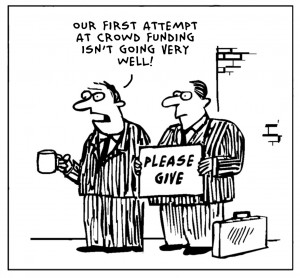On my train to work, I routinely am requested to donate money multiple times (and not just by the homeless guy outside the station). One comes in the form of a new project with a homemade advertisement up in the train station – and in the corner is a ‘find us on Kickstarter!’ logo. I’m then asked by my regular podcast to support them through Maximum Fun through either a subscription or one-time support. The author of the article I’m reading asks for support through Patreon. By the time I get to work, where I could potentially pull out my banking information and support any of these initiatives, I’m thinking less about actually doing so and more about the new phenomenon of crowdfunding, wondering how effective this new phenomenon is. Not to mention, there’s no way I can support all the wonderful creators that solicited me during my commute. Plus, I realize I’m beginning to tune out the requests.
Don’t get me wrong – there’s a time and a place for crowdfunding. It can support a new business during its most vulnerable time and can provide small injections of funding when all you need is to test an idea. But it does best for people actually producing something and for ‘sexy’ topics of the day. Yet, indiscriminately choosing crowdfunding (or any other sort of funding) without consideration of which funding strategy is best can really hurt your cause, causing groups to shift their mission. So let’s think about the science of fundraising and how crowdfunding fits into a larger fundraising landscape. How is it changing the relationship between those who need support and the typical people who fund them?
According to a typology of fundraising by Stanford University, crowdfunding fits into the category of Member Motivator, where donors pay to be a member of an organization or club and expect some personal benefit. This is the idea behind the podcast asking for support – I receive my morning information in return for some cash. According to that Stanford report, such fundraising efforts should ask the following questions:
- Will our members feel that the actions of the organization are directly benefiting them, even if the benefit is shared collectively?
- Do we have the ability to involve and manage our members in fundraising activities?
- Can we commit to staying in tune with, and faithful to, our core membership, even if it means turning down funding opportunities and not pursuing activities that fail to resonate with our members?
Asking these questions highlights that, despite recent popularity and success within the crowdfunding world, other approaches might work better depending on what you are raising money for. For example, if you are a scientist working on basic research that does not include the cute and cuddly of this planet, you are providing a public good. We all know the importance of basic science and can point to great societal advancements that result in this broad thinking. However, it cannot offer quick or individual returns on personal investments, and therefore donors will lose interest. According to the typology, a better fundraising strategy might be government funding, which has a mandate to watch out for the public good in the long-term. This exact phenomenon is why crowdfunding could never replace recent cutbacks in the National Science Foundation, as some have suggested.
Which is where much of my concern lies – people view crowdfunding as a panacea in an otherwise tight economy. In reality, most campaigns fail. As Forbes put it, “the crowdfunding perception does not align with the crowdfunding reality“. Namely, they point out that crowdfunding may not be worth the effort for your project, especially with new regulations coming on line regarding liability and capping annual donations and revenue. According to the authors, you’ll likely be putting in more time and risk than you want to for what you get in return.
But what I really wonder is who funds these crowdfunded projects? I couldn’t find any good data on this floating around, though several people have publicly wondered the same thing on reddit and Google+. A very high percentage of successful Kickstarter projects are dance (70%), leading me to believe that lots of donors want to support the arts and find this a friendly way to do so on their own terms. Popular jokes make me think that parents also make up a high proportion of donors. While I’m sure many of the donors are in the position to make donations, many are not. There’s a beauty in being able to support a friend’s mission with the $2 left in your bank account. But effective? I wonder.
Finally, back to the story that started me thinking about crowdfunding in the first place – is it bad that there are increasing number of crowdfunding requests everywhere? The BBC seems to think so, especially if you’re reaching out multiple times and starting with asking friends and family. Those close network connections – who often receive the request first – can feel pressured to help you out, even if it presents a hardship to them. Crowdfunding does have the wonderful nature of personalizing donor relationships, but if those relationships are already personal, it can get awkward.
Crowdfunding is a wonderful new turn in supporting creative thinking and risky ideas. But it’s not the best for all applications. And remember if you’re contemplating starting a crowdfunding campaign, you exist in a landscape of other fundraising activities – including many other crowdfunding campaigns. Make yours new and different.
